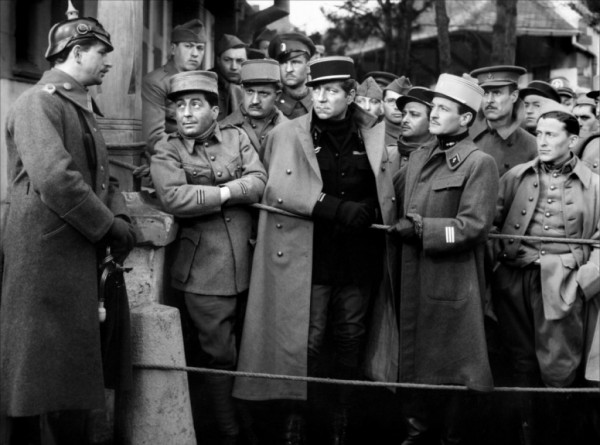It has been 75 years since the original release of Jean Renoir’s excellent anti-war film The Grand Illusion, which gained massive critical praise and stirred much controversy resulting in it being banned in both France and in Nazi occupied territories.
Two French fighter pilots, the aristocrat Le captaine de Boeldieu (Pierre Fresnay) and the working class Le lieutenant Maréchal (Jean Gabin) are shot down by German fighter pilots and captured. Consequently they meet Captain Von Rauffenstein (Erich Von Stroheim) who takes them to a prisoner of war camp. Once established in their new environment, the two French fighter pilots begin planning their escape. They fail in their multiple attempts and are removed to the stronghold of Wintersborn; only a final act of bravery from one of the pilots can result in one of them gaining their freedom.
Jean Renoir is a director who deserves every ounce of praise that is heaped upon him – he was often thought of by greats such as Orson Welles and Jacques Rivette as one of the greatest directors of all time. When you watch a masterpiece such as The Grand Illusion is it is easy to see why he received such praise. From its excellent script that traverses multiple themes such as class, war, international politics and friendship (all handled with intelligence and charm), to the truly nuanced performances, this film is a pleasure to watch from its beginning to its conclusion 2 hours later.
The fraught dynamic between Boeldieu and Maréchal captivatingly explores the concept of a rapidly changing Europe. The old world, in which the aristocracy still mattered, is fading away, replaced by a modern world in which class, at least in strict terms, was no longer a hindrance to people’s opportunities. Equally as interesting is the way in which Renoir, who it should be noted co-wrote the film with Charles Spaak, explores the complex relationships between countries. As the storm clouds gathered during Hitler’s rise to power, those relationships became more and more difficult. Through a selection of characters, both central and secondary, the film explores national feelings and ideologies. Also important is Renoir’s positive portrayal of the Jews through the character of Rosenthal (the name no doubt intended to mimic the wealthy industry tycoon Rothschild family) a wealthy French Jew, who Renoir makes sure to portray in as positive a light as possible.
Ultimately The Grande Illusion is about its anti-war message, but there is more to it than that. The film is explicit about Renoir’s views on the futility of war, a message so strong that the film was banned in France until the end of WWII. Some re-releases come and go, drawing little attention, but The Grande Illusion is a film that all cinephiles must see and now thanks to this beautiful restoration audiences can once again enjoy the complexity and emotion of what is undoubtedly Renoir’s masterpiece.

















{ 0 comments… add one now }